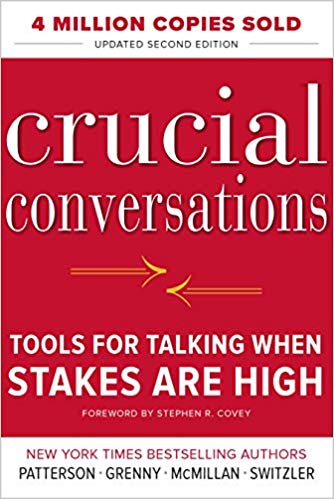

This article is an excerpt from the Shortform summary of "Crucial Conversations" by Kerry Patterson. Shortform has the world's best summaries of books you should be reading.
Like this article? Sign up for a free trial here .
What are crucial conversations? What kinds of crucial conversations are there, and how do you recognize crucial conversations?
Crucial conversations are an important part of conducting a healthy dialogue in many facets of life. Keep reading to learn the answer to the question “what are crucial conversations” and how they can help you.
What Are Crucial Conversations?
What are crucial conversations? How do you recognize a crucial conversation?
The authors of Crucial Conversations argue that:
- How people behave when they disagree with others about important, emotional issues is the cause of many problems in work and home life.
- People can learn to handle crucial conversations effectively.
- When people learn how to handle these conversations, their relationships improve and organizational performance improves.
So what are crucial conversations? They’re not limited to important people talking about high-level things. They’re typical interactions you have every day — which can have a huge impact on your life.
A crucial conversation is a discussion characterized by high stakes, differing opinions, and strong emotions.
Here’s an example of each of the criteria:
- Differing opinions differ: You want a promotion but your boss thinks you’re not ready.
- High stakes: You and your coworkers are discussing how to change the company’s failing marketing strategy.
- Strong emotions: Your spouse thinks you were flirting at a party.
What Are Common Crucial Conversations?
There are many crucial conversation topics that, if mishandled, can lead to disastrous results in your personal life or at work. They include:
- Personal: Ending a relationship, asking a roommate to move out, resolving a custody issue with an ex-spouse, dealing with a troubled teen, confronting a loved one about problem behavior.
- Work: Confronting a coworker about a problem, giving the boss critical feedback, critiquing a colleague’s work, presenting a negative performance review, confronting a team member who isn’t following through, confronting a coworker who has poor hygiene.
Why Crucial Conversations Fail
Despite the importance of crucial conversations, we often avoid them because we’re afraid we’ll make matters worse. If total avoidance isn’t possible, we may send emails or leave messages instead of talking face-to-face.
When we do have crucial conversations, we handle them badly. We behave our worst at the most critical moments. We yell, withdraw, or say things we later regret. This happens because:
- Nature works against us. When under stress, whether physically or emotionally, we’re genetically programmed to respond with fight or flight. We get an adrenaline surge and blood is diverted from the brain to muscles so that our thinking ability suffers.
- We get caught off guard. Crucial conversations often catch us by surprise — someone blurts out something and we have little time to think. We have a knee-jerk reaction and later end up wondering, what was I thinking?
- We lack the right skills. We don’t know where to start in terms of responding to or initiating a crucial conversation, so we just plunge in. You can sometimes practice for crucial conversations, but you have to know what to practice — and even with practice you can still screw up.
- We act in self-defeating ways. We act in ways that keep us from getting what we want. We’re our own worst enemies. For example, when one partner is neglecting the other, the injured partner may respond with sarcasm and sniping — which causes the offending party to spend even less time with the injured party.
Relationships, careers, organizations, and communities are built on the ability to talk about high-stakes, difficult topics. Therefore, mishandled conversations have a huge impact. In fact, they’re at the root of a majority of persistent problems in organizations, teams, and relationships.
The Value of Mastering Crucial Conversations
Now that you know the answer to “what are crucial conversations” you can understand their value. Despite the challenges and risks, anyone can learn to effectively hold tough conversations about virtually any topic.
Learning to master crucial conversations can:
Boost Your Career
When you can address difficult topics effectively, you’ll be influential and effective at getting things done, and you’ll build strong relationships.
For example, you’ll be able to stand up to the boss without committing career suicide, or debate controversial issues without going overboard and creating enemies. You don’t have to choose between honesty and your career. You can get people at all levels to listen without getting angry or defensive.
Improve Your Organization
Having leaders and employees who skillfully handle crucial conversations can improve an organization’s performance, while poorly handled conversations and interactions can undercut it.
When Employees Have Good Conversation Skills
On the positive side, the authors’ research shows that companies whose employees are skilled at crucial conversations:
- Respond faster to financial downturns.
- Are less likely to be injured due to unsafe conditions.
- Increase the productivity of virtual (remote) work teams.
- Influence misbehaving or incompetent colleagues to do better.
Most leaders think that organizational productivity and performance are driven by policies, processes, or systems. When there are problems they adjust these things, but it often doesn’t work because the problem is behavior, not systems.
So what is a crucial conversation, in the workplace? Solving behavior problems requires crucial conversation skills.
When Employees Have Poor Conversation Skills
On the negative side, when organizations have performance problems such as snowballing costs, late delivery times, and poor morale, the biggest reason is employees’ unwillingness or inability to speak up (have crucial conversations) at key moments. Some of these employees may be asking: What are crucial conversations?
For example, employees see others take shortcuts or make mistakes, and don’t say anything, which impacts safety, turnover, and productivity. Also, projects can fail when employees stay silent about problems — for instance, when goals are unrealistic, team members perform badly, or leadership stumbles.
Improve Your Relationships
What is a crucial conversation and its role in your relationship?
Failed crucial conversations can cause relationships to fail.
When people break up they often blame it on differences of opinion on important issues. But while everyone argues about important issues, clearly not every relationship ends in turmoil — it’s how you argue that matters.
From the authors’ research observing couples, they found that people handle difficult conversations in one of three ways:
- They resort to threats and name-calling.
- They retreat into angry silence.
- They speak honestly and effectively.
The researchers found that helping couples hold crucial conversations more effectively reduced their chances of unhappiness or breakup by more than half.
Improve Your Health
You now know that crucial conversations can help with work and your personal relationships. But what about health? What is a crucial conversation’s ability to make you healthier?
The ability to master high-stakes crucial conversations contributes to a healthier and longer life.
On the other hand, communication problems can exacerbate health problems:
- Immune system weakness: A study showed that couples who argued more had weaker immune systems than those who resolved difficult conversations well (a weak immune system results in poor health).
- Life-threatening diseases: In a study of people with life-threatening cancer, researchers taught a group of them effective communication. Five years later, this group had a higher survival rate than the group that didn’t get the training. Improvement in the ability to talk with others corresponded to a two-thirds decrease in the death rate.
- Repressing negative emotions: The negative feelings we hold in and the emotional pain from unhealthy conversations slowly erode our health. It can lead to both minor and major health problems.
Not only do you now know the answer to the question “What are crucial conversations?”, but now you have an idea of how they work and when to use them. You can also help others understand the answer to what are crucial conversations in order to better your communication skills.

———End of Preview———
Like what you just read? Read the rest of the world's best summary of Kerry Patterson's "Crucial Conversations" at Shortform .
Here's what you'll find in our full Crucial Conversations summary :
- How to approach an argument without getting mad
- The mistakes most people make when trying to listen to someone else
- How to come up with win-win solutions that make everyone happy






